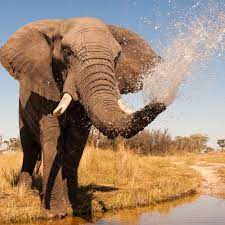
Botswana Vaccinations and Travel Advice
Botswana, “the African Miracle”, is one of the finest African safari destinations. Located North of South Africa, Botswana is dominated by two main ecosystems : the arid Kalahari desert and the fertile Okavango delta ; with vast Savannah grasslands lying in-between. With antelopes, blue wildebeests, hippopotamuses, crocodiles, rhinoceroses, big cats, countless bird species, one of the last population of the critically endangered African wild dog and large flocks of African elephants, Botswana’s wildlife is simply exceptional. The country also has the best social and sanitary situation on the continent. It is not a cheap destination… but Botswana is truly worth the money spent!
HEALTH INFORMATION FOR BOTSWANA
We make every effort to ensure that the information posted on our website is up to date and accurate according to the latest public health recommendations; however, it is impossible for us to make changes on a daily basis.
For the most current travel health recommendations, please call our clinic as make an appointment with one of our travel health professionals.
BOTSWANA – RECOMMENDED VACCINES
| The Yellow Fever Vaccine |
A proof of vaccination against yellow fever may be required upon entry in to this country. Some travellers may not be eligible to receive this vaccine. Please enquire with your health care professional regarding your specific details. For further information, please consult with the World Health Organization (WHO) website: |
| Hepatitis A | Recommended for all travelers. |
| Hepatitis B | Recommended for all travelers. |
| Causes, Symptoms & Treatment – Typhoid fever | Recommended for all travelers. |
| Tetanus – Diphteria – Pertussis Vaccine | Tetanus: In exceptional circumstances (eg, stay in a region where access to health care is limited), for a person aged 18 years or older, 1 dose of DT may be given if 5 years or more has elapsed since the last dose. Otherwise, one booster dose at the age of 50*.
Pertussis (Whooping Cough): 1 dose is recommended for pregnant women, for every pregnancy, regardless of immunization history and the interval since the last dose (betwen week 26 and 32). *Only applicable for Quebec. |
| Measles – Rubella – Mumps | Two doses recommended for all travelers born after 1970, if not previously given. |
| Cholera | For humanitarian workers and health care providers. |
| Flu – Influenza | Seasonal influenza occurs worldwide. The flu season usually runs from November to April in the northern hemisphere, between April and October in the southern hemisphere and year round in the tropics. Influenza (flu) is caused by a virus spread from person to person through coughing and sneezing or by touching infected surfaces. Everyone 6 months and older should get a flu vaccine yearly. Vaccine is recommended 14 days prior to departure. |
| Routine vaccines (dCaT, Polio, Meningococcal, Shingles, Pneumococcal, Hepatitis B, HPV, MMR & Varicella) | Recommended for all travelers |
| African Tick Bite Fever | Presence. All travellers should protect themselves against tick bites. |
| Transmission, Symptoms and Prevention – Rabies | For travelers at high risk of animal bites or being involved in activities with bats, dogs and other mammals. Clients who plan to visit remote areas may consider receiving this vaccine. Important to note the pre-exposure rabies vaccine is administered in 2 doses with one week interval between doses. Post-exposure vaccination is always recommended, even for those previously vaccinated. |
| Schistosomiasis | Avoid swimming in fresh water. |
| Turista – Traveler’s Diarrhea (ETEC) | Talk to your health care professional about the risks and precautionary measures to take, as well as the Dukoral® vaccine. Important to note that the Dukoral vaccine is an oral vaccine given in 2 doses, recommended at least 2 weeks prior to departure. |
| Malaria | Malaria is present in this country. The risk may be region specific. Prophylaxis measures to be discussed with the health care professional. |
| Dengue Fever, Chikungunya and/or Zika | There are many illnesses that are transmitted via mosquito bites and unfortunately we do not have vaccines to protect us against most of them. It is important to inquire with your healthcare professional regarding the specific risks and the different illnesses presently in circulation. |
RECOMMENDED MEDICATIONS FOR TRAVELLING TO BOTSWANA
| Antimalarials Recommended | Malarone, Doxycycline or Mefloquine |
| Antibiotics Traveler’s Diarrhea | Azithromycin or Suprax |
MEDICAL CARE IN BOTSWANA
Botswana is a leader among the other Southern African countries regarding public health care. The government is working really hard to provide access to quality medical care to the entire population. Public hospitals have been renovated. They are relatively well equipped and have regularly trained medical staff. But despite these encouraging facts, the health care system in Botswana is not adequate yet. The Gaborone Private Hospital, the Princess Marina Hospital and the Medical Rescue International in the capital city are among the favorite establishments of travelers.
In case of emergency, call 997. If you prefer a private ambulance, usually faster to come, contact the Medical Rescue International at +267 390 1601.
Most of the medicines sold in Botswana are produced in South Africa. Some European and American drugs are impossible to find in the country, so be sure to bring all the medicines you could need.
SECURITY ABROAD
Pickpocketing, theft and “smash and grab” robberies occur.
CANADIAN EMBASSY
Emergency services
In case of emergency, dial:
- police: 999
- medical assistance: 997
- firefighters: 998
